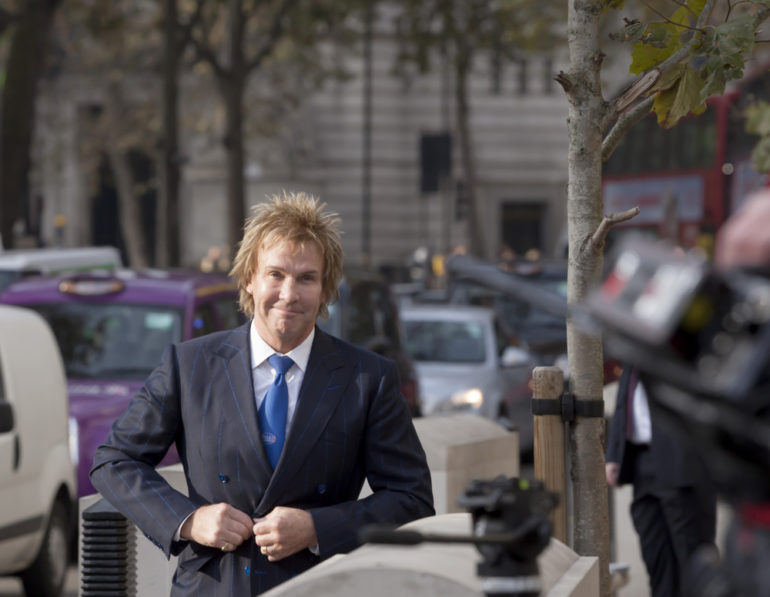Pimlico Plumbers today lost a landmark Supreme Court case against a self-employed gas engineer who should have been treated as an employee after his heart attack.
Gary Smith, who worked for Charlie Mullins’ business for nearly six years from 2005, deserved paid holiday and sick pay as well as other perks including rest breaks, judges have ruled.
Smith previously won a number of court rulings that determined he could claim ‘worker’ status, even though he was described in his contract as a ‘self-employed operative’.
Those were upheld unanimously by five Supreme Court justices, who rejected an appeal by Pimlico Plumbers.
Taxi app Uber, car service Addison Lee and takeaway food courier Deliveroo are among those who hire their drivers as self-employed, entitling them to only basic protections such as health and safety.
Mr Smith’s victory is set to have huge ramifications for businesses and self-employed staff going forward.
Announcing the decision in London on Wednesday, Lord Wilson said an employment tribunal was ‘entitled to conclude’ the firm could not be regarded as having been a ‘client or customer’ of Mr Smith.
The judge said: ‘Although the contract did provide him with elements of operational and financial independence, Mr Smith’s services to the company’s customers were marketed through the company.
‘More importantly, its terms enabled the company to exercise tight administrative control over him during his periods of work it; to impose fierce conditions on when and how much it paid to him, which were described at one point as his wages; and to restrict his ability to compete with it for plumbing work following any termination of their relationship.’
Charlie Mullins says the result will lead to a ‘tsunami of new claims’ and accused the government of leaving employment law in the 20th century
The ruling is likely to have a major impact on the sort of flexible working arrangements which have been on the rise in recent years and could affect a number of other cases currently progressing through the courts.
Mr Smith, a plumbing and heating engineer, was one of 125 contractors Pimlico Plumbers could call on to carry out jobs for its customers and had a company uniform and van which he rented.
He claimed that, after suffering a heart attack in 2011 and trying to reduce his hours, he was unfairly dismissed and the tribunal made a preliminary finding that he was a ‘worker’ within the meaning of the 1996 Employment Rights Act.
That decision was upheld by the Employment Appeal Tribunal and again by the Court of Appeal in January last year.
The Court of Appeal found Mr Smith was a worker because he was required to use the firm’s van for assignments and was contractually obliged to do a minimum number of hours a week.
As a ‘worker’, he is entitled to employment rights including holiday and sick pay.
Mr Smith will now be able to go ahead with his employment tribunal claim for unfair dismissal against Pimlico Plumbers as a ‘worker’.
Pimlico plumbers, which was founded in 1979, is the largest independent plumbing firm in London and now has a work force of over 270.
Chief executive Charlie Mullins has said that Mr Smith’s case was different from other cases involving the status of employees, including delivery and taxi drivers, but will have ‘huge ramifications’ on employment law for a number of industries.
Mr Smith was one of 125 contractors Pimlico Plumbers could call on to carry out jobs for its customers and had a company uniform and van which he rented.
He claimed that, after suffering a heart attack in 2011 and trying to reduce his hours, he was unfairly dismissed and a tribunal made a preliminary finding that he was a ‘worker’ within the meaning of the 1996 Employment Rights Act.
Mr Smith was registered to pay VAT and paid tax on a self-employed basis but he worked solely for Pimlico Plumbers.
The lower courts decided he was a worker rather than self-employed.
The Court of Appeal said Mr Smith was a worker because he was required to do a certain number of hours’ work per week and to use a Pimlico Plumbers van while doing so.
That decision was upheld by the Employment Appeal Tribunal and again by the Court of Appeal in January last year.
The Appeal Court found Mr Smith was a worker because he was required to use the firm’s van for call-outs and was contractually obliged to do a minimum number of hours a week.
Lawyers for Pimlico Plumbers and Mr Mullins argued the previous rulings were wrong to conclude Mr Smith was a worker.
Michelle Morgan at Gardner Leader solicitors. said: The Supreme Court’s ruling will have big ramifications for other high-profile employment cases that are coming through the courts. One involving Uber drivers will go to the Court of Appeal later this year; Uber is looking to overturn a decision that backed two drivers seeking to be recognised as workers and not self-employed.
“This decision will undoubtedly result in massive changes to the way in which the gig economy is run. Businesses will need to alter their models to minimise the risk of worker status being invoked and the rights that accompany such status. The decision is an important one as on the one hand there is the need to protect the rights of those who work in the gig economy, whilst preserving the ethos of such a business model; with flexibility being at the heart of it.”


